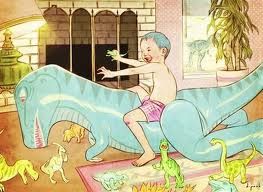Creativity
Why Weird Experiences Boost Creativity
Unusual and unexpected events facilitate flexible thinking.
Posted June 11, 2012
Creative people think differently. But why? There is no magic bullet or single pill. We all have the potential for creativity, but there are so many different triggers that can broaden our minds, inspire, and motivate. Of course, there are just as many triggers that can shut down our minds. Since creativity is so important for individual well-being and societal innovation, it's important that we systematically pull the right triggers.

A crucial trigger is the experience of unusual and unexpected events. These events can take many different forms, ranging from the loss a parent to living abroad. But one need not experience any of these specific events to think more creatively. In a recent paper in Journal of Experimental Social Psychology, Simone Ritter and colleagues propose that any life experience, from the traumatic to the joyful, can lead to flexibility and creativity as long as it diversifies your experiences and pushes you outside your normal thought patterns.
To test their idea, the researchers put people in a virtual reality world where participants took a virtual three-minute stroll through the university cafeteria, and during the course of their walk experienced weird events that violated the laws of physics. In one event, as people walked closer to a suitcase standing on a table, the size of the suitcase decreased, but as they walked away, its sizeincreased. In another event, people were made to feel as though they were walking faster than they really were, and in a third event, as people walked toward a table, a toy car inched closer to a bottle, but when the car actually hit the bottle, instead of falling to the ground it slowly moved upwards!
They also had people take a test of cognitive flexibility where they were required to come up with as many ideas as possible to the question "What makes sound?" Those who generated a greater variety of categories were scored as more cognitively flexible. Those who were actively engaged in the weird virtual-reality world scored higher on the test of cognitive flexibility than a group of people who engaged in a normal version of the virtual world, and higher than a group of people who just watched a film showing the unexpected events. They also found that their results couldn't be explained by differences in positive or negative emotion.
In a second experiment they asked participants to prepare a sandwich with butter and chocolate chips (apparently, this is a breakfast delicacy in the Netherlands, where the study was conducted). Some people were told to prepare the sandwich in an unusual order, first putting chocolate chips on a dish, then buttering the bread, and then placing the bread buttered-side-down on the dish with the chocolate chips. They had another group make the sandwich in the usual order, and another group just watched a video of a person making the sandwich in either the unusual way or the usual way. Again, people who actively made the sandwich in the unusual order scored highest in cognitive flexibility compared with the other groups, and the results couldn't be explained by differences in positive or negative emotion.
These results are provocative and have some important implications. While prior research shows that early traumatic life experiences can be conducive to creativity, thankfully it's not necessary to lose a parent or experience a physical illness to see the world differently. The core feature is actively experiencing a violation of how things are supposed to happen. The results help explain why periods of immigration often precede extraordinary periods of creative achievement: Immigrants bring their own customs and ideas to a new environment, diversifying experiences for everyone.
These results also suggest that if you want to get into a creative mindset, do your normal routine in a completely different way. Write with your other hand. Moonwalk backwards on your way to work. Eat something new for lunch. Smile at strangers. Be weird. With your brain re-shuffled, you'll be in a better position to be creative.
© 2012 by Scott Barry Kaufman.
Follow me on Google Plus or Twitter.


